Keeping chickens in winter. What I do to look after my flock in the cold, rain and snow.
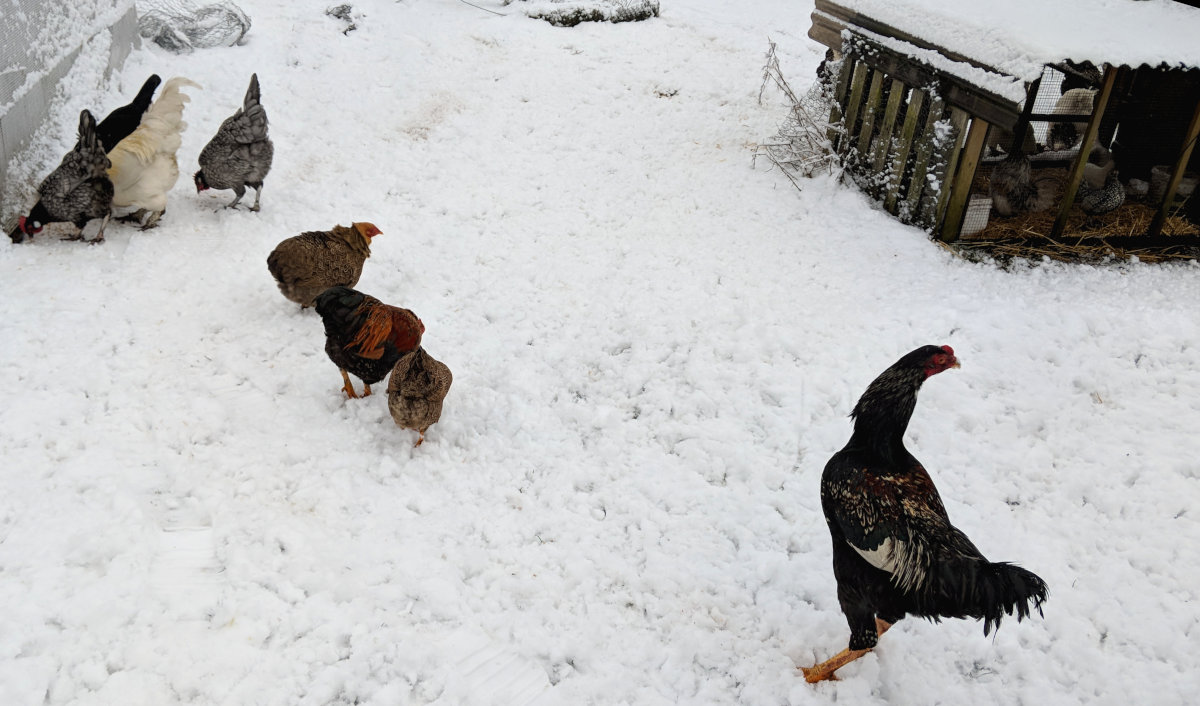
Chickens can tolerate cold weather well, especially if it is dry. They still need a suitable coop and proper care to stay healthy during winter.
Table of Contents
My chickens free range all year and most flocks of chickens can go outside in winter if weather conditions permit, but ensure they have access to a warm and sheltered coop as well.
Below: This is what my land looked like last winter. I get snow and ice most years but really the wind and rain are bigger problems for chickens.
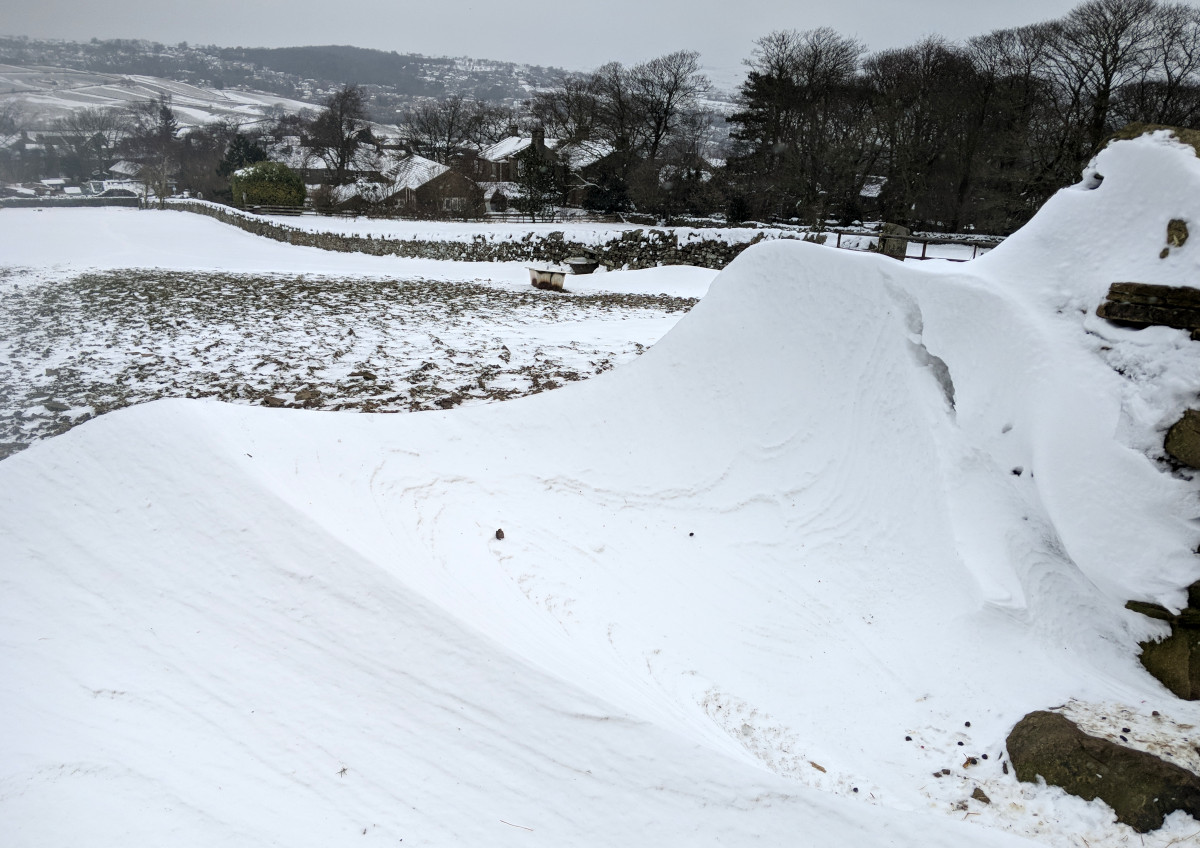
Top tips for chicken care in winter:
Caring for chickens in winter requires attention to their specific needs during cold weather.
By providing a warm and comfortable coop, adjusting their diet, and ensuring proper health, hygiene and entertainment, your chickens can stay happy and healthy throughout the winter months.
Remember to offer mental stimulation and outdoor access whenever possible to keep them engaged and content.
Here are some of the ways I care for my flock in winter:
- Insulation and Ventilation: The first step in winter chicken care is preparing the coop to withstand the cold temperatures. Proper insulation, balanced with proper ventilation to avoid excessive moisture buildup helps retain heat and keeps the coop warm and more importantly dry. Excessive moisture buildup can lead to respiratory issues.
- Normal behaviours: Make sure that chickens can indulge in normal behaviours like pecking, scratching, roosting and dust bathing. Otherwise you could end up with stress and fighting in the flock.
- Coop Bedding: Providing suitable deep layer of bedding that is at least 10 cm. This is essential for keeping chickens warm during winter. Straw or pine shavings make excellent bedding materials as they provide insulation and are comfortable for chickens to nestle in. Regularly change the bedding to maintain cleanliness and dryness or consider the deep litter method for extra warmth and insulation.
- Cover the run or provide shelter: Being able to shelter from the rain, snow and wind is important for chickens in winter. Getting wet and frostbite can be more easily prevented if birds are kept dry.
- Feed greens, fodder or sprouts: Chickens love their greens but these are often lacking in winter.
- Good water Management: One of the significant challenges during winter is preventing the chicken's water source from freezing. A heated waterer or adding warm water to the existing waterer can help keep the water in a liquid state. Check the water frequently to ensure it remains accessible.
- Adjusting the diet: During winter, chickens require additional calories to maintain their body temperature but less protein for egg production. Adjust their diet to include more grains and high-energy foods. Adding cracked corn or shelled sunflower seeds can provide the necessary energy for the cold season.
- Increase the frequency of feeding during winter: More frequent meals help chickens maintain their energy levels and stay warm. Make sure the birds are roosting with a full crop.
- Make sure they birds are roosting: Birds roosting in contact with each other will stay much warmer.
- Get them up early in the mornings: I take a light down to my chickens at around 7:30 am in the morning. This gets them up, about and eating after the long winter nights.
- Feed hot food: Adding a cup of wheat, oats or barley to boiling water and allowing to cool to 40 C or 100 F will help chickens stay warm and conserve energy.
- Stay healthy: Chickens are susceptible to frostbite, primarily on their combs and wattles. Applying petroleum jelly or a similar protective substance can help prevent frostbite. Additionally, ensuring proper coop ventilation and avoiding drafts can minimise the risk.
- Deal with Vermin: It is not just your chickens that are after food, shelter and fresh water in winter. You will need to double down on your control of rats mice and other vermin during the winter months.
- Predators: Predators are more active in winter as food is scarce, so it is important to be aware of them and take steps to protect your chickens. You can do this by installing a predator-proof fence around the coop or by using other deterrents.
- Regular flock check-ups: Check your birds more often in winter to make sure they have food and water and are not suffering in the cold or wet. A veterinarian familiar with poultry health can identify any potential issues and provide appropriate treatment.
- Maintain a clean environment: A clean coop is essential for keeping chickens healthy during winter. Regularly remove soiled bedding and droppings to prevent the buildup of harmful bacteria, smells and ammonia.
- Exercise and mental stimulation: While chickens may have limited outdoor access during winter, it's essential to provide them with indoor activities to prevent boredom. Hanging treats or placing a chicken-friendly mirror in the coop can provide mental stimulation.
- Outdoor access: I am a great believer in free range when it comes to poultry so whenever weather conditions permit, allow chickens to have outdoor access. Fresh air and natural sunlight are beneficial for their well-being.
- Frozen eggs: Collect eggs more frequently to prevent them from freezing. If eggs do freeze, allow them to thaw slowly in the refrigerator before use.
- Combating boredom: Winter days can be long and boring for chickens. Hanging cabbage or peck blocks in the coop can provide a fun and nutritious activity for them.
- Heat Sources: Consider using supplemental heat sources to provide extra warmth on extremely cold days. Heating lamps or heated pads designed for coops can be installed, but ensure they are safely placed to prevent any fire hazards. Supplemental heat should never be the sole source of warmth, as chickens need to acclimate to the cold to maintain their natural body temperature.
Below: This is my setup for winter chicken keeping.
You can see the thick layer of straw, raised walkway, inside dust bath and covered mobile run. Also these birds are eating sprouted and greened canola to make sure they get their winter greens.
Dealing with common winter issues as a chicken keeper:
Winter is a time of short days, cold, wet and freezing weather and increased predator and vermin activity.
Its funny but one of the things my chickens dislike the most about winter is when the snow gives way under their feet and they drop into it a little.
Below: Hungry foxes are bold and difficult to deal with. This one is standing his ground a few feet from me.
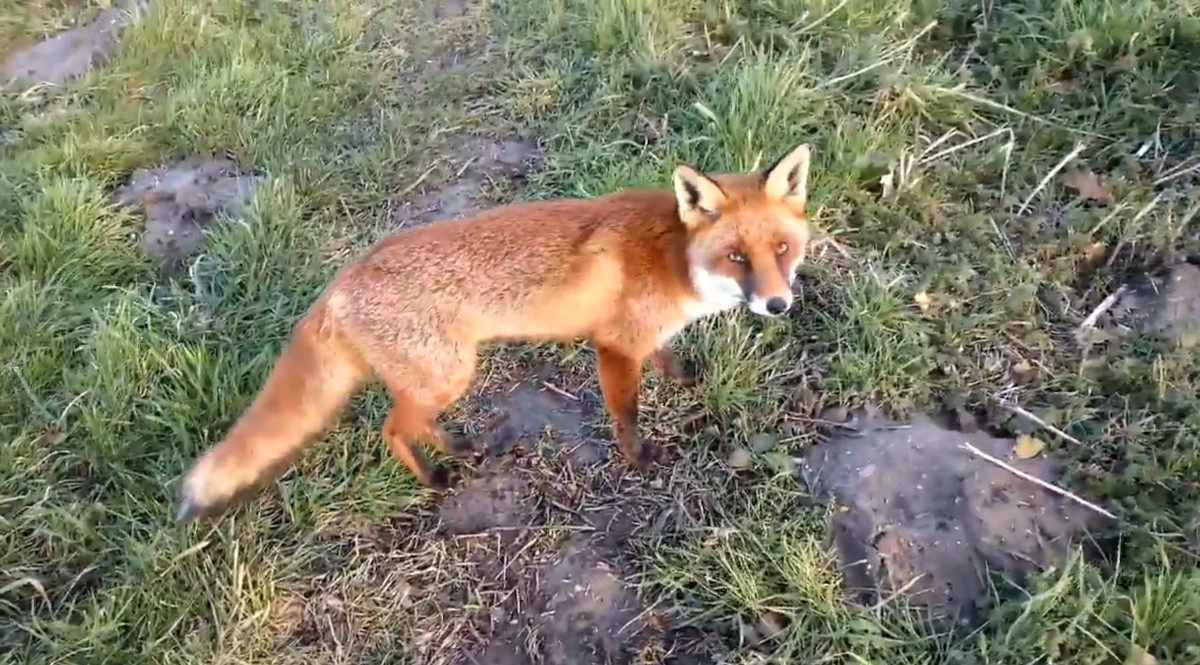
Ensure pathways around the coop are free from ice and snow to prevent slipping injuries. Careful with any use of salt as a deicer when chickens are around as they may well eat it and that can lead to all sorts of digestive issues.
Below: This is me after I went arse over tit in the mud three years ago while tending to my chickens. I was carrying a 25 kg sack of feed at the time sand broke a few bones in my foot.
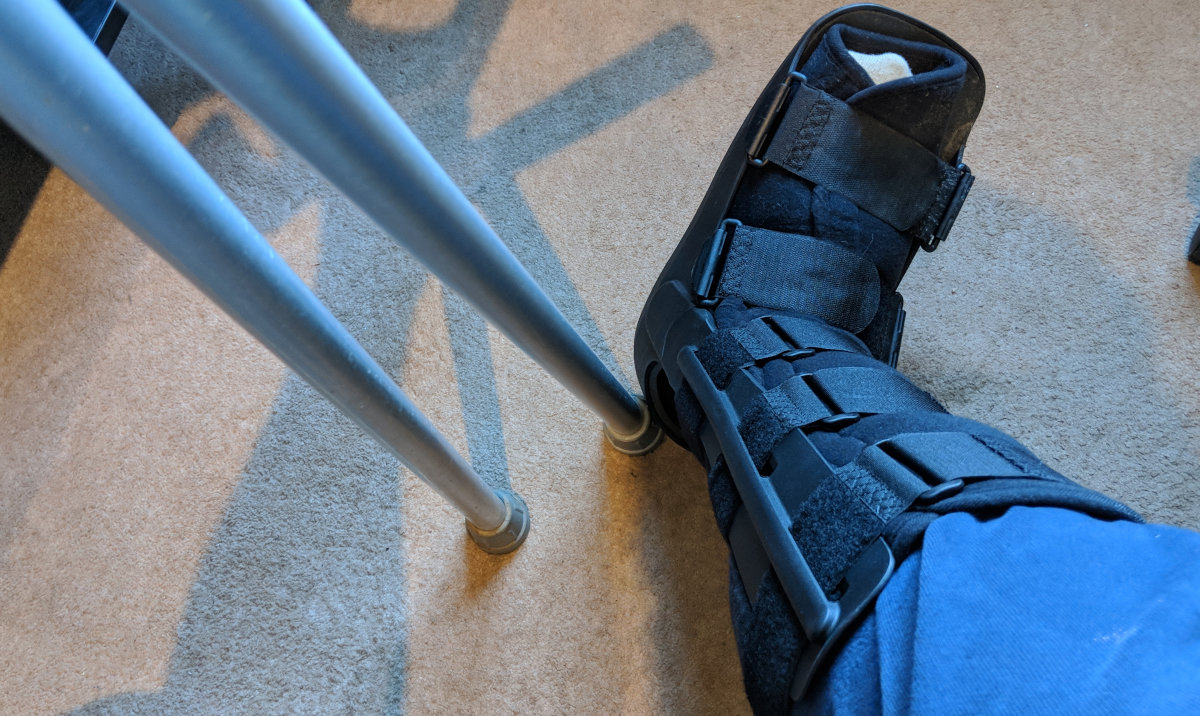
Some birds may still be laying so deep soft bedding and protected nest boxes are still required. Egg need to be collected often as frozen eggs crack and can lead to egg eating.
Ventilation in the coop is something that needs to be considered as the days shorten for winter. Air flow is still a necessity but it can become more difficult to control with changeable weather.
I cover some of my vents with material or denim patches, it still allows air to move, can be opened and closed as required but slows the air down and mitigates the effect of the wind.
Chickens have a complex network of blood vessels in their legs and feet that act as a heat exchange, allowing their feet to get cold without cooling the rest of the body.
Below: While chickens do not like the cold and wet, they do tolerate it.
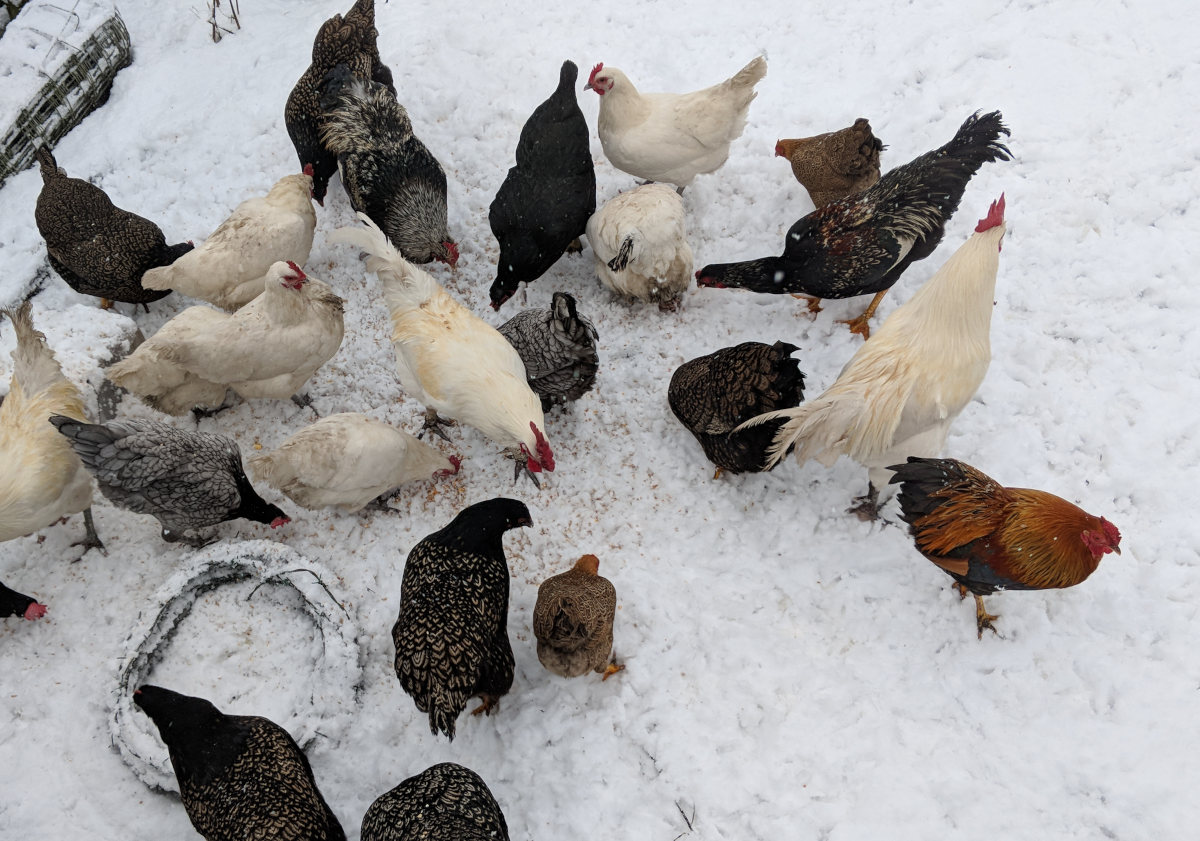
It does help to choose a cold hardy breed of chicken in you live in a place where it freezers regularly.
Other resources for keeping chickens happy and healthy in the ice cold and wet of winter.
There is and increased risk of injury during winter months for both keepers and birds.
- Which chicken breeds cope with cold better.
- Dealing with wet and muddy chicken runs.
- Baby chicks and the cold and wet weather.
- How does the cold tolerance of chickens change as they get older.
- Keeping your hens laying in winter.
- Bantams in the cold, wet and ice of winter.
- Care of specific chicken breeds like the Silkie.
- Sprout seeds and grains for winter chicken feed.
- How to grow green fodder for chickens year round
- Ways to keep your chickens in fresh greens for winter.
I would say that wet is far more of a risk to the health and well being of chickens than cold. I find that once the ground freezes in winter
